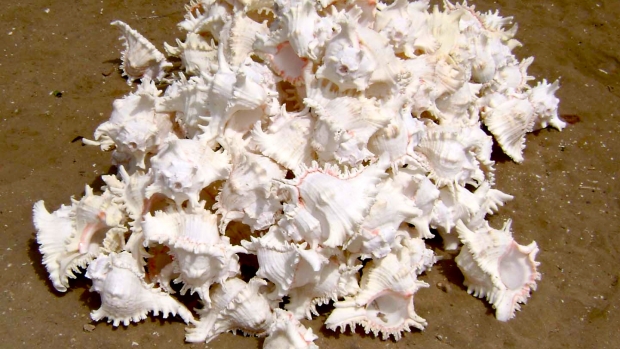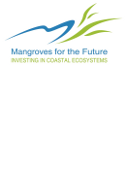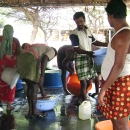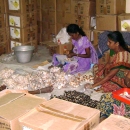Grants :: Small Grant Facilities :: Commercially important gastropod shell resources and trade in India: Distribution, Status & Conservation strategies
Commercially important gastropod shell resources and trade in India: Distribution, Status & Conservation strategies

Processed Murex shells, Rameswaram, Tamil Nadu, India © vinod malayilethu
Objectives
The overarching goal of this project is develop a conservation strategy for sustainable exploitation of gastropod shell resources. The objective is to document the distribution, status and trade of commercially important gastropod shell resources along the coasts of Tamil Nadu and Kerala.
Background
Molluscs have always played a significant role in Indian traditions and in the economy. With an extensive coastline of 7,516 km and an Exclusive Economic Zone (EEZ) of 2.1 million km2, the molluscan biodiversity along India's mainland and islands are rich and varied, especially in the coral reefs and intertidal areas. It is reported that 3,271 species of molluscs (from 220 families and 591 genera) including 1,900 species of gastropods, 1,100 bivalves, 210 cephalopods, 41 polyplacophores and 20 scaphopods have been recorded in Indian waters.
Marine gastropod resources are exploited for various purposes and often go unnoticed, as they form only a minor component of marine fishery resources. Many species are exploited for the purposes of manufacturing ornaments, curios and various other artifacts of commercial value. Gastropods in particular occupy an important role in the commercial shell craft industry in South India. Despite the potential threat of over exploitation of gastropod resources, there is no comprehensive data available on the distribution, species wise landings, species diversity and the volume of export and import of gastropod resources along the Indian coast.
In Tamil Nadu on the South-east coast of India, WWF, with technical support from the Central Marine Fisheries Research Institute (CMFRI), conducted surveys in major fish landing centers in Palk Bay (9°17'N 79°18'E), specifically in Rameswaram, Mandapam and Keezhakarai, and the Gulf of Mannar (8°48' N, 78° 11' E) between Tuticorin and Tirunelvelli. In Kerala on the west coast of India, surveys were conducted in Kollam (8°54' N, 76° 38 E), specifically in Sakthikulangara and Neendakara fishing harbors where the majority of trawlers land.
Target beneficiaries
Local shell collectors, traders, and Self Help Groups involved in the ornamental shell industry
State and Central Department of Environment and Forests, and Department of Animal Husbandry, Dairying, and Fisheries
Coastal Zone Managers
Outputs
- A field guide to the gastropod shell resources of Kerala and Tamil Nadu
- A scientific baseline study of the distribution and status of commercially important gastropod shell resources
- A value chain analysis of the commercial trade of gastropod shell products
- Recommendations for sustainable management and use of gastropod shell resources in Kerala and Tamil Nadu
Accomplishments and challenges
- There is limited awareness of the protected status (under the Wildlife Protection Act, 1972) of gastropod shell species, and an even lesser knowledge of how to identify these species at the ground level. As such, there have been tensions between traders and local law enforcement officials, leading up to wrongful arrests and loss of livelihoods and income. Collecting data initially proved to be a challenge as some stakeholders were mistrustful of the purpose of the project.
- The project was able to establish the basic chain of trade of gastropod shells, from extraction at the source to sale at large tourist souvenir, and other shops, in Kerala and Tamil Nadu. The information is being taken up by both State Departments of Environment and Forests in an effort to promote sustainable use of the resource; the information has also been passed on to the Gulf of Mannar Biosphere Reserve Trust (GoMBRT) as it bears direct relevance to management of resources in this Protected Area (PA).
- Thousands of kilograms of shell resources are exported out of India - national and international enforcement of laws protecting gastropod species will require a collaborative effort from international agencies and governments. A policy brief is in development to raise awareness of this resource and its use.
Contributions to cross-cutting themes
Men and women, and by extension their families, depend on coastal resources for their lives and livelihoods. However, the extent of this dependency is unknown. This project aims to examine the dependency on the gastropod trade industry to ultimately increase the sustainability of coastal communities livelihoods.
Lessons Learned
The ornamental gastropod industry provides income for a large number of people. However the long-term sustainability of the industry is challenged due to limited awareness of the status of the species, limited capacity in being able to identify between species, and issues related to effectively monitoring operations within the industry. The addressing of these challenges requires multi-sectoral collaboration.
Project Facts
Country
Location
Tamil Nadu (Gulf of Mannar, and Palk Bay), Kerala (Wedge Bank, Kollam)
Topic
- Knowledge for Management
- Strategies for Management
- Monitoring, Learning and Evaluation
- Capacity Building
- Integrated Coastal Planning
- Marine Protected Areas
- Knowledge management and communications
Duration
9th Dec 2011 to 31st Oct 2013
MFF Grant Amount
INR 794,200
Implementing Partner
Mr. Vinod Malayilethu
Senior Coordinator - Marine Conservation Programme
World Wildlife Fund (WWF) India
vinodm@wwfindia.net
Related Images
Related Publications

Commercially Important Gastropod Shell Resources and Trade in India: Distribution, Status & Conservation strategies
WWF India SGF project - Final Report
Author: WWF India
Publisher: MFF India
Posted on: 2nd Sep 2014
Category: SGF (Small Grant Facility)
Size: 3.4 MB


